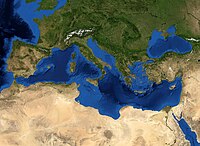
Photo from wikipedia
Abstract This article discusses the relations between the French, Portuguese and Spanish socialist parties during the transitions to democracy in the Iberian Peninsula (1974–7). It focuses on the attempt of… Click to show full abstract
Abstract This article discusses the relations between the French, Portuguese and Spanish socialist parties during the transitions to democracy in the Iberian Peninsula (1974–7). It focuses on the attempt of these parties to establish a distinctive ideological trend, Southern European socialism. The main argument is that the French socialists attempted to promote their ideological line – and predominantly the union between socialists and communists – in the Iberian Peninsula during the transitions to democracy. The Portuguese Socialist Party and the Spanish Socialist Workers Party initially considered following this line. However, the radicalisation of the Portuguese revolution in the sensitive context of Cold War détente, as well as the involvement of the European social democrats in both Portugal and Spain against the union of the left, prevented this model from being further considered by the Spanish and Portuguese socialist parties. Nevertheless, all these parties showed interest in promoting a common Southern European Socialist identity that differed from European social democracy as well as from Soviet communism, considering it useful in the struggle for hegemony within the left.
Journal Title: Contemporary European History
Year Published: 2019
Link to full text (if available)
Share on Social Media: Sign Up to like & get
recommendations!